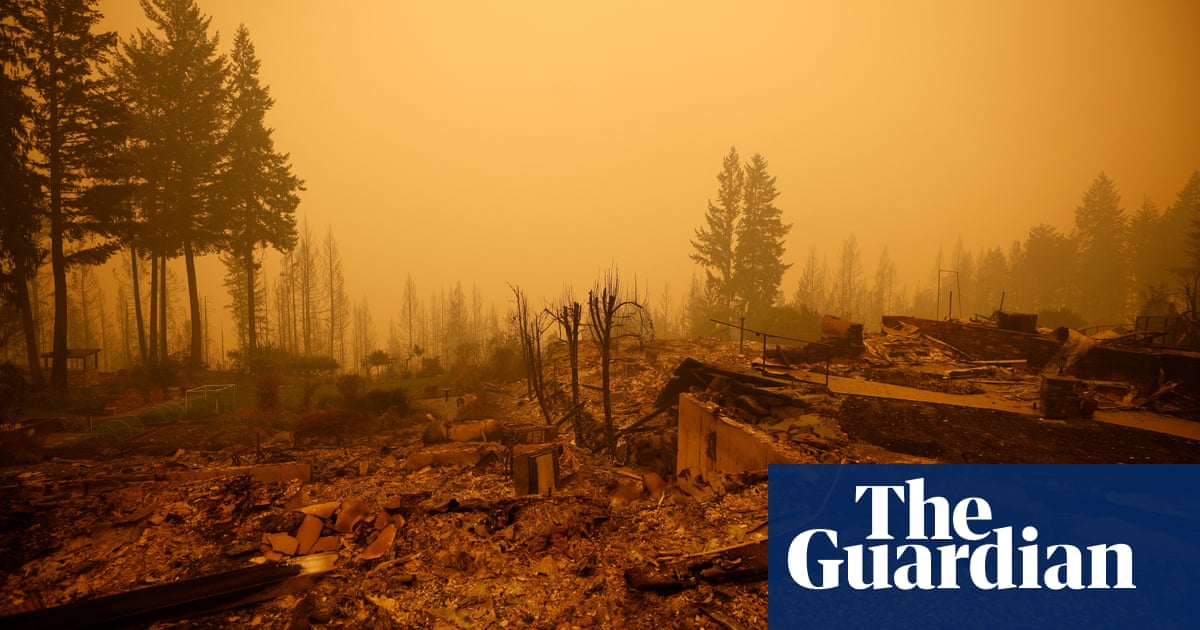Eco-anxiety is not an official medical diagnosis, but everyone knows what it means. The American Psychological Association defines it as “the chronic fear of environmental cataclysm that comes from observing the seemingly irrevocable impact of climate change and the associated concern for one’s future and that of next generations”. Fear of the future, an ache for the past, the present awash with disquiet: into this turmoil Alice Mah’s new book appears like a little red boat, keeping hope afloat against all odds.
Mah is a professor of urban and environmental studies at the University of Glasgow as well as an activist passionately concerned with pollution, ecological breakdown and climate justice. Her previous books, Petrochemical Planet andPlastic Unlimited, catalogued the catastrophic impacts of the petrochemical industry on the natural and human world. In Red Pockets, the trauma is personal.
For some, eco-anxiety is paralysing; for others it is a spur to action. Not many respond by heading off to sweep the graves of their ancestors. For Mah, this suggestion, proposed by her father when he hears of her plan to visit her ancestral village in southernChina, takes on the urgency of a quest. In Chinese folk traditions, ancestors neglected by their descendants become “hungry ghosts”, creatures with “bulging stomachs, dishevelled hair and long, thin necks, suffering from insatiable neediness”.
Red Pockets is divided into three parts: the first chronicling Mah’s trip to China. Accompanied by her cousin Amanda, and a local guide, Lily, Mah fails to find her great-grandmother’s grave. Her gifts of tea in British telephone box tins are received with disdain – “not as good as Chinese tea”. What the village elders, the cantankerous Uncle Mah in particular, actually want is for her to build a house in the village. Or at least hand out envelopes of cash – the “red pockets” of the book’s title.
Mah returns from her trip with more questions than answers, and plagued by physical symptoms of escalating eco-anxiety: breathlessness, insomnia, bouts of weeping. In the second section of the book, we see a haunted, despairing woman facing the magnitude of the problem. In 2021, she is part of a delegation to the Cop26 climate conference. “I don’t know what I expected to find,” she writes, “but I was wholly unprepared for that mass Doomsday event.” Meanwhile, her mother calls from Canada: “It’s end times here,” she says. Following a summer of drought and wildfires, landslides across British Columbia destroy thousands of homes.
To cope with the panic attacks, Mah tries therapy, but gives up after a few weeks. “My ‘intrusive’ thoughts about the climate crisis were not distortions; they were real,” she writes. “My hackles were rising again, a tuning fork for what lay beneath.”
All this makes Red Pockets sound like little more than a litany of despair. But in part three, Mah offers a way out of the intergenerational trauma, the possibility of “living with the ghosts”: “There is a bridge between divided worlds, a place where all spirits can rest without sorrow … When the wind blows just right, I edge a bit closer.”
Robin Wall Kimmerer’sThe Serviceberry(2024) can be seen as a sister book to Mah’s, lighter in tone, but equally powerful. For both women, the way out of ecological and social collapse requires a different way of thinking. Cultivating gratitude and joy, alive to the debts we owe to the social, spiritual and natural world that sustains us.
“The hungry ghosts still clung to me … but I knew what I had to do,” Mah writes. “Search for an offering. Neither fruit nor incense would suffice, nor would a set ritual. It should be something uniquely my own, but also beyond myself, communal and facing outward.”
Sign up toInside Saturday
The only way to get a look behind the scenes of the Saturday magazine. Sign up to get the inside story from our top writers as well as all the must-read articles and columns, delivered to your inbox every weekend.
after newsletter promotion
Given the subtitle, it is no revelation that the offering she is referring to is the book itself. Red Pockets offers no catch-all solution, but instead poses a question about how we ought to live in troubled times – as insatiable individual consumers or part of an interdependent community of living beings. What will you become to your descendants: hungry ghost or supportive ancestor? In that choice lies agency, and hope.
Red Pockets: An Offering by Alice Mah is published by Allen Lane (£20). To support the Guardian, order your copy atguardianbookshop.com. Delivery charges may apply.
